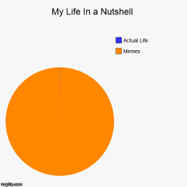Are you looking to explain a tough concept ‘in a nutshell?’ This post unpacks the meaning and origin of this expression.
Meaning
The expression ‘in a nutshell' means a shortened version of something complex. For instance, if you’re trying to condense a speech into cliff notes, you would give someone the important points without going through all the finer details.
If you give someone the brief details of something, you’re giving it to them ‘in a nutshell.’ It’s similar to the expression ‘stop beating around the bush,’ where you don’t waste people's time on non-specific details of a task or speech.
Example Usage
"Ok, so here's the plan. In a nutshell, we'll have everything ready the night before and load it into the car. We'll set off first thing at 5 am and get there before sunset."
"In a nutshell, she was just a crazy person, and U don't know what I was doing with her to make her so mad."
"We were driving behind that truck when we saw it hit the other car and veer off the side of the cliff. The cops arrived three minutes before the emergency services. That's the story, in a nutshell."
"In a nutshell, I'm here for six weeks researching the effects of spearfishing on the wahoo population in South Florida. Then it's back to the lab for analysis."
"The first owner had it for five years before selling it to his next-door neighbor. That's the car's history, in a nutshell; it's a good buy."
"If we unpack all of this, it will take forever. So, in a nutshell, it's a seminar about the effects of quantum physics on our reality."
"In a nutshell, I paid for the property, and they refuse to evict the squatters. I feel like the landlord is taking advantage of me, and I demand satisfaction."


Origin
The expression 'in a nutshell' originates from 'Pliny the Elder,' in AD 77, translated to English in 1601 by the philosopher Philemon Holland.
"We find in Histories almost incredible examples of sharpness of the eyes. Cicero hath recorded that the poem of Homer called the Iliad, written on parchment, was enclosed within a nutshell. The same writer maketh mention of one who could see to the distance of 135 Miles."
William Shakespeare is credited with popularizing the phrase, using it in his play 'Hamlet,' where it appears as follows.
"I could be bounded in a nutshell and count myself a king of infinite space, were it not that I have bad dreams."
The figurative use of
the expression appears in the 19th century in 'The Second Funeral of Napoleon,' written by Thackeray in 1841.
"Here, then, in a nutshell, you have the whole matter."
Phrases Similar to In a Nutshell
- Just the cliff notes.
- In short.
- In brief.
- To sum things up.
Phrases Opposite to In a Nutshell
- A complex argument.
- The whole shebang.
- Don’t hold back on the details.
What is the Correct Saying?
- In a nutshell.
Ways People May Say In a Nutshell Incorrectly
The phrase, ‘in a nutshell,’ has nothing to do with nuts or their shells. The ‘nutshell’ in the saying is a brief framework explaining the basics of a concept in an easy-to-understand format for another person. Using it to describe nuts or eating nuts is incorrect.
Acceptable Ways to Phrase In a Nutshell
You can use the expression ‘in a nutshell’ when describing a general overview or a short summary of events. The phrase suits social and professional use. For instance, you could use it at work to break down a new process for people in simple points they can understand.
Or you could describe the plot of Game of Thrones to your partner ‘in a nutshell’ to bring them up to speed before the start of the new season. You can use ‘in a nutshell’ in text-based and verbal communications with friends, coworkers, family members, or random people you meet.